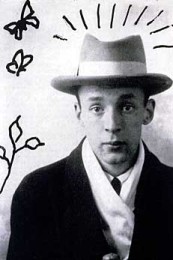Nonlinear Nabokov
 Sunday, March 23, 2008
Sunday, March 23, 2008 
In his Letters to a Young Poet, Rainer Maria Rilke wrote most achingly of the need, for those so called, to write...
ask yourself in the most silent hour of your night: must I write? Dig into yourself for a deep answer. And if this answer rings out in assent, if you meet this solemn question with a strong, simple "I must," then build your life in accordance with this necessity;
Vladimir Nabokov - a pre-eminent author of the 20th century, Russian emigre, butterfly expert, author of Lolita - built his life according to Rilke's mandate.
But he shuffled while he wrote.
Nabokov's writing method typically included composing on index cards. Quirkily, he would shuffle these cards daily, allowing him to see different paths to take by looking at the story unfolding in different ways.
This non-linearity in structure was also matched by a non-linearity in focus: he often wrote the middle of the story last.
At several thousand index cards per book, this produces a lot of different paths.
Yet Nabokov's books are marvels of precise writing - made more improbable that even though his native language was Russian, he wrote in English. No word, sentence, paragraph is imaginable in any other position.
It's as if the literature bubbled out of the shuffling madness in a pure form. An "emergent" story line, to co-opt the most popular adjective of complexity theorists.
And now the case of the 50 Index Cards. Nabokov was working on The Opposite of Laura when he died. Only 50 index cards long , he requested on one of the index cards that the cards be destroyed upon his death. For a variety of reasons, they were not. Currently his son Dmitri has them, and is pondering either their release or destruction. (Read all about it here.) The case brings up all sorts of interesting dilemmas, and there are as many opinions of what to do as there are authors who have weighed in.
How non-linear: a non-book on index cards that may or may not have become a full-fledged book may be released. The actual order of the cards is not necessarily what Nabokov would have published. Indeed, it is possible that he would have discarded some of the cards, or re-written them.
So, if published with all of this swirling uncertainty, are the wishes of Nabokov being violated? Technically yes, but, since Nabokov's non-linear process was a wellspring of his genius, shouldn't sudden changes in plans be welcomed, whether the planner is around to see the changes or not? This is an especially cogent argument, given the meta-connection, structure within structure theme: apparently the story line is about "work that seems to be unfinished,” according to Brian Boyd, a Nabokov biographer.
Perhaps Laura should be published electronically, with the order of the pages appearing randomly on each reading. Put it on an iPod, hit shuffle, and enjoy the nabokovian nuances.
And wonder about the connection of non-linearity and emergent structure to literary creativity.
 R.A. DiDio
R.A. DiDio
Dmitri Nabokov has recently announced that The Original of Laura will be published. Note that he claims that he never considered destroying the index cards, as his father wished.
 Complexity in
Complexity in  Literature & Poetry,
Literature & Poetry,  Randomness
Randomness 

Reader Comments (1)
wadonxrum981
Choose the life that is most useful, and habit will make it the most agreeable.